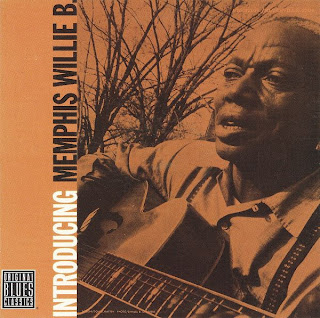He joined the Army during World War II, and saw action in North Africa and Italy, then finished up his army duties as the driver for a colonel in the quartermaster corps, where his actual main job was playing the guitar and entertaining the troops. After the war, though, he found he hadn't much of a career to pick up, as his old style didn't mesh well with the new rhythm and blues, so he gave up on music, and thus it stayed until 1961, when Sam Charters, in Memphis and still blazing a mostly lonely trail rediscovering the classic blues musicians, got into a conversation with Will Shade of the old Memphis Jug Band, and Shade told him about a blues singer from the old days whom he'd run into a couple of weeks previous:
His name's Willie B....that's what we call him. He's one of those real hard blues singers like you're always asking about.
Willie B. was invited to a Saturday night gathering at Shade's. Charters got to hear him play "the real old hard blues," liked what he heard, and got Willie into a Memphis recording studio.
It was a long session, yielding enough material for two LPs. Borum drew on a range of material. It included many original blues, some dating back to earlier times. "Overseas Blues" was written in 1945 while he was still in the army in Italy, in response to a rumor that his unit, which had already seen plenty of action, was to be deployed to the Pacific to engage in the war against Japan.
Others were songs that had entered his repertoire at one time or another. "Every Day I Have the Blues" had achieved considerable popularity in the 1950s with recordings by Count Basie with Joe Williams and by B. B. King, but it's a much older song than that, going back to Borum's heyday in the mid-1930s. It was first recorded in 1934 by Aaron "Pine Top" Sparks of St. Louis, then in the late 1940s by Memphis Slim as "Nobody Loves Me," and with Slim taking the composer credit. The many subsequent versions generally changed the title back to "Every Day I Have the Blues," giving composer credit to both artists. It's likely that Slim picked up the song in the earlier decade, had been performing it ever since, and had made it his own. It's likely, also, that Borum, who would certainly been exposed to a lot of Slim's music around Memphis and the blues circuit that they both traveled, would have been playing the song since way back when.
"The Stuff is Here" is one of that urban genre of blues that playfully glorified drugs. It was written in 1934 by Clarence Williams and first performed by his wife, Eva Taylor. Most of its recorded versions are by women in the "classic blues" style with jazz accompaniment, but Borum does it with harmonica and guitar, and makes his own song out of it.
Sam Charters produced along with Kenneth S. Goldstein, by now heading up the Bluesville label for Bob Weinstock. The two Bluesville albums were called Introducing Memphis Willie B. and Hard Working Man Blues. Willie B. was not afraid to get a little raunchy, and his "Car Machine Blues" was included in Bluesville's Bawdy Blues compilation.
Memphis Willie B.'s first recorded session was to be his last, although he did have a successful career renaissance at blues clubs and festivals through the 1960s, before slipping quietly back into obscurity until his death in 1993. But he seems to have liked what he accomplished on that day. Charters reports that when he listened to the playback, he said:
I was kind of nervous, you know, but that's really the blues. That's the blues just like we were talkin' about.


1 comment:
Again, fantastic writing. Went to Youtube to hear some Memphis Willie B. Atmospheric, heartfelt...and wonderful blend of guitar and voice. Thanks for this!
Post a Comment